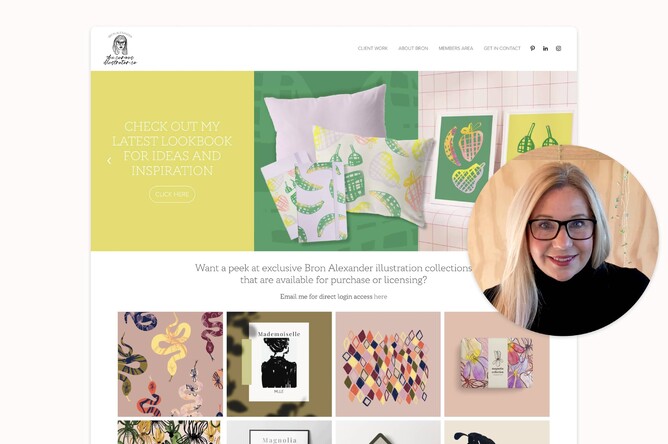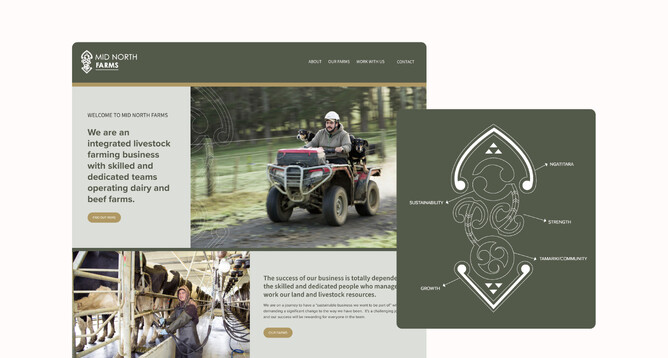“There are so many people that are afraid or just wait for things to come to them in life. If that's the way you are, it would pay to think seriously about whether the freelancer life is really what you want, it can be super tough out there!” reflects Bron Alexander, freelance Graphic Designer, Illustrator and Art Director. Her words are harsh but pertinent, and perhaps what we need to hear.
Freelance life is many graphic designers’ dream - they want creative freedom, personal autonomy and the ability to work with who they want when they want. They envision their days of being stuck in a stale office, labouring over work they aren’t passionate about, for clients who frustrate them as finally over. It sounds pretty great right?
Yet designers often wear rose-tinted glasses when envisioning freelance life, they overlook the not-so-creative side of business: the stress of hustling for clients, managing their cash flow, marketing themselves and future planning. The reality is, sometimes freelance life doesn’t work out, at least not at first – which is what Bron found.
“People think freelance life looks so easy,” explains Bron, “they don’t see the constant networking and putting yourself out there, not knowing where your next lead will come from. Taking on so many projects but needing to not drop the ball.” Bron has been freelancing on and off since 2010 and has developed a toolkit of both design and business skills.
The first time Bron seriously committed herself to freelance work she fortuitously found herself contracting as the Creative Director for Nourish Magazine. The role was demanding, requiring a swathe of art direction and design skills, client management, social media, and photographic and video content. Bron loved the work, but there was a big problem, the magazine was published quarterly – meaning she was only paid quarterly. And any designer who has worked in print will know that during magazine week things are pedal to the absolute metal, which made it difficult for Bron to take on additional clients regularly.
“When I look back, it was really low paying. I had no cash flow to speak of, and I had no money skills to make my quarterly payment last to the next pay.” Bron used her ingenuity to supplement her income, selling goods at markets, doing pop-up stores and taking on part-time retail work. But the juggle began to take its toll - “Ultimately it just left me burnt out and grumpy, I couldn’t do the best job at the magazine or with my other commitments.” Bron soon ended up back in paid employment – seeking financial stability to buy a property with her partner, but her dream of freelance hadn’t died.
Fast-forward a few years, a successful bank loan application, a global pandemic and two employment tenures and Bron found herself willing to take the plunge into freelance life again – but this time she would go in with a plan and the counsel of her partner – “there were learnings from the first time around we could put into effect.”
Keeping subscription costs low has been crucial to her new business model. “I run a lean, mean, working machine because we have really strict plans in place. I don’t even have a printer in my office, that’s how lean my business is,” says Bron. Instead of timekeeping apps, she uses google sheets and a free timer, she prints things at The Warehouse Stationery when the need is there and only subscribes to Adobe and Dropbox.
She does use Hnry to manage her accounts, but as a confessed spender, “not having access to my Tax and GST money is the best way to go.” Setting aside at least 12 weeks of income always is crucial to Bron's current business plan. This safety net provides her with a windfall for quiet periods and relieves a lot of money anxiety.
“A trade-off of being a freelancer is the unavoidable grey space of billable hours,” elaborates Bron. “If I spend 40 hours in the office, 10 of those are probably non-billable.” Emails, invoicing, and other miscellaneous jobs that you can’t bill for add up. Employees have the privilege of chatting to co-workers over coffee, freelancers on the other hand are strictly on the clock. Bron advises that freelancers should be aware of this ‘grey space’ and factor it into their budgeting.
Networking plays a crucial role in a freelancer's success, and Bron emphasizes the importance of cultivating strong relationships. Word of mouth and reputation have been significant factors in attracting clients for her, more so than advertising or social media. Leveraging existing digital networks, such as LinkedIn or Facebook, can be effective in generating new work opportunities.
Networking is an integral part of a successful freelance career and a constant work in progress. Bron is always on, going to events and putting herself out there to cultivate a network of strong relationships. “My clients all come down to relationships, not advertising or social media, but reputation and word of mouth.” She recommends leveraging your existing digital network when looking for new clients, a post on LinkedIn or Facebook can go a long way to generating work.
Just as important as client relationships, are Bron’s relationships with other freelancers – especially if you want to go on holiday. “It’s really hard to find someone you trust to look after your clients and not be afraid that they will necessarily steal them or develop better relationships than you have.” Bron is fortunate to have a great relationship with another freelancer whom she trusts with her cherished clients, and she sees this relationship as critical to her personal well-being. After all, everyone needs a holiday sometimes.
Bron’s experience highlights the challenges and reality of life as a freelancer. Sure, it offers creative freedom and autonomy, but running your own business requires diligent networking, financial planning, and managing the uncertainties of income and workload.
Remember to network relentlessly, budget ruthlessly and try your utmost hardest to run a “lean mean business machine.”











